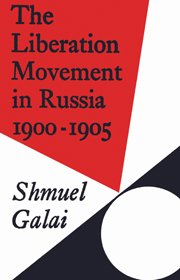Book contents
- Frontmatter
- Contents
- Dedication
- Acknowledgments
- Note on dates, etc.
- List of abbreviations
- Introduction
- Part One ORIGINS
- Part Two THE FORMATION OF THE LIBERATION MOVEMENT
- Part Three WAR AND REVOLUTION
- 9 Setback and recovery
- 10 ‘No enemies on the left’
- 11 Unleashing the Revolution
- 12 Defeat in victory
- Appendix A The origins of Beseda
- Appendix B A bibliographical note on the writings of Kuskova and Prokopovich in the years 1898–9
- Appendix C Note on sources on the formation of the Liberation Movement
- Bibliography
- Index
9 - Setback and recovery
Published online by Cambridge University Press: 22 September 2009
- Frontmatter
- Contents
- Dedication
- Acknowledgments
- Note on dates, etc.
- List of abbreviations
- Introduction
- Part One ORIGINS
- Part Two THE FORMATION OF THE LIBERATION MOVEMENT
- Part Three WAR AND REVOLUTION
- 9 Setback and recovery
- 10 ‘No enemies on the left’
- 11 Unleashing the Revolution
- 12 Defeat in victory
- Appendix A The origins of Beseda
- Appendix B A bibliographical note on the writings of Kuskova and Prokopovich in the years 1898–9
- Appendix C Note on sources on the formation of the Liberation Movement
- Bibliography
- Index
Summary
The surprise attack launched by Japanese naval detachments on the Russian forces in Port Arthur on the night of 26/27 January (8/9 February) 1904, started what may be described as the most unpopular war in Russia's history. The adventurous policy of Nicholas II, which proved to be one of its direct causes, was condemned at the time not only by the revolutionary and oppositional elements in society, but also by the most responsible ministers in the government, namely Witte, Lamsdorf (Foreign Minister) and even to some extent by the War Minister, A. N. Kuropatkin, as well as by the majority of the Imperial family. Besides the ‘Bezobrazov Clique’, only Plehve seems to have supported the Tsar's Far-Eastern policy. His main reason was, apparently, his wish to please Nicholas and to discredit Witte. But in conversations with ministers, Plehve apparently expressed the opinion that ‘the war would distract the attention of the masses from political questions’, a remark paraphrased as the quest for ‘a little victorious war’. As events were soon to show, instead of being victorious, the war turned out to be disastrous for Russian arms. This, together with the fact that it was conducted in an area where no vital Russian interests seemed to have been threatened, apparently accounted for its unpopularity. In the words of Struve, ‘the overwhelming majority of the Russian people have no interest either in Manchuria or in Korea and Japan’.
- Type
- Chapter
- Information
- The Liberation Movement in Russia 1900–1905 , pp. 196 - 213Publisher: Cambridge University PressPrint publication year: 1973

